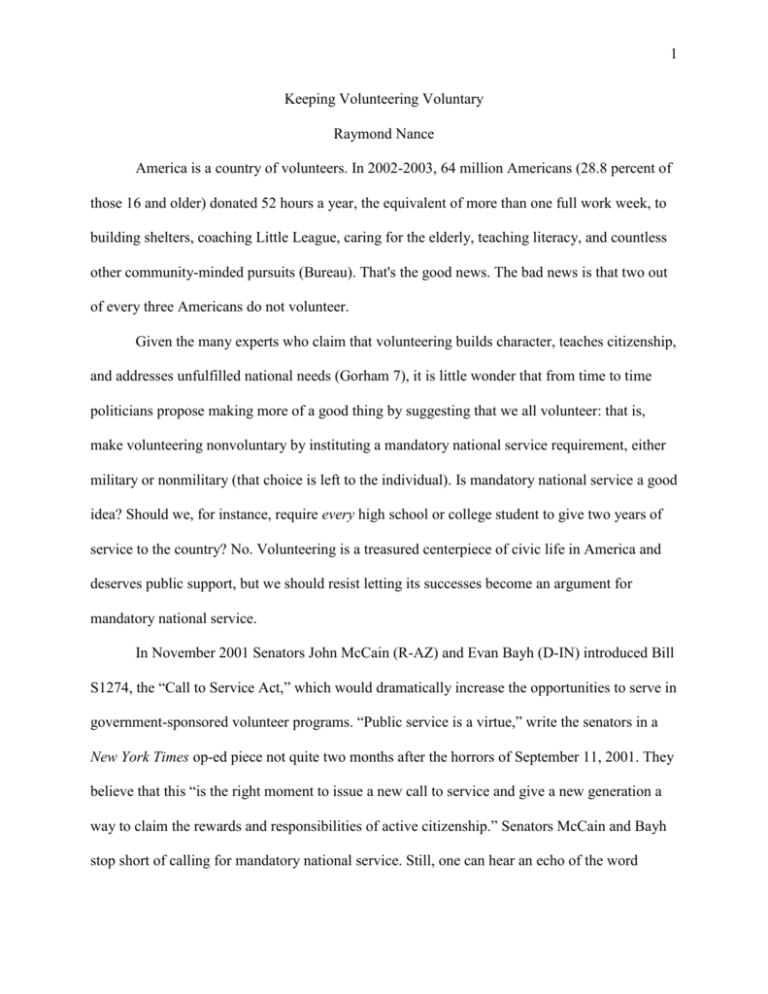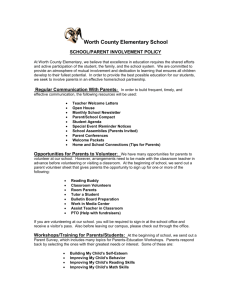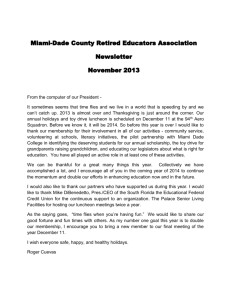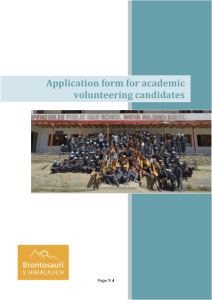Keeping Volunteering Voluntary
advertisement

1 Keeping Volunteering Voluntary Raymond Nance America is a country of volunteers. In 2002-2003, 64 million Americans (28.8 percent of those 16 and older) donated 52 hours a year, the equivalent of more than one full work week, to building shelters, coaching Little League, caring for the elderly, teaching literacy, and countless other community-minded pursuits (Bureau). That's the good news. The bad news is that two out of every three Americans do not volunteer. Given the many experts who claim that volunteering builds character, teaches citizenship, and addresses unfulfilled national needs (Gorham 7), it is little wonder that from time to time politicians propose making more of a good thing by suggesting that we all volunteer: that is, make volunteering nonvoluntary by instituting a mandatory national service requirement, either military or nonmilitary (that choice is left to the individual). Is mandatory national service a good idea? Should we, for instance, require every high school or college student to give two years of service to the country? No. Volunteering is a treasured centerpiece of civic life in America and deserves public support, but we should resist letting its successes become an argument for mandatory national service. In November 2001 Senators John McCain (R-AZ) and Evan Bayh (D-IN) introduced Bill S1274, the “Call to Service Act,” which would dramatically increase the opportunities to serve in government-sponsored volunteer programs. “Public service is a virtue,” write the senators in a New York Times op-ed piece not quite two months after the horrors of September 11, 2001. They believe that this “is the right moment to issue a new call to service and give a new generation a way to claim the rewards and responsibilities of active citizenship.” Senators McCain and Bayh stop short of calling for mandatory national service. Still, one can hear an echo of the word 2 compulsory in their claim that “national service should one day be a rite of passage for young Americans.” Proposals for compulsory national service are nothing new. In 1906, the philosopher William James argued in "The Moral Equivalent of War" that the military virtues of discipline, hard work, loyalty, and belief in causes greater than oneself should not be taught only in wartime. A civil society benefits enormously from these values, said James, and we should teach them to our youth. But we should not need to be constantly at war to do so. James proposed a "moral equivalent of war" that would teach military virtues in peacetime. He would send college students off to a hard, nonmilitary service in order to learn the values of citizenship and to "get the childishness knocked out of them" (18). James's essay became the philosophical foundation of America's volunteer movement. Inspiring as that vision was and continues to be, it is no longer practical (if it ever was) to send all college students off to "coal and iron mines, to freight trains, [and] to fishing fleets in December" so they might "come back into society with healthier sympathies and soberer ideas" (18). In 1906, there were many fewer young people, both in the general population and in colleges (Landrum, Eberly, and Sherridan 22). At the time, the logistics of compulsory national service may have seemed manageable to James. Today, however, such a proposal, while attractive in theory, could scarcely be managed. Think of the complications of sending every college freshman off to a year of national service. Organizations such as AmeriCorps and VISTA have a hard enough time finding meaningful work for mere thousands of volunteers who earnestly wish to volunteer. Expanding that effort to include millions of students (many of whom would resent their service) would require a huge federal bureaucracy that could not guarantee meaningful opportunities for participants. And providing transportation, housing, and oversight 3 (these are kids, remember) would entail enormous expense. Nonetheless, James strikes an important chord with his vision of learning the virtues and disciplines of citizenship through a nonmilitary regimen in peacetime. His phrase "moral equivalent of war" has entered our national vocabulary (Landrum, Eberly, and Sherridan 22), and for a hundred years writers interested in volunteerism in America have been quoting him. The question of what sort of service, or obligation, citizens owe a country is as old as civilization. In one of his famous dialogues, Plato records a conversation between Socrates, whom Athens had imprisoned and condemned to death for corrupting the city’s youth with his teachings, and a friend who urged that he escape and save himself. Socrates argues that if he has accepted and enjoyed the privileges of citizenship, then he must also accept the judgment of the State. According to Socrates, citizens obligate themselves to the State when they accept its benefits. But how is that obligation to be paid? Some twenty-four hundred years after Socrates accepted what he considered his duty by drinking a cup of hemlock, Americans pay their obligations to the government differently (thank goodness!): through taxes, jury duty, and obedience to laws passed by elected officials. Can the government compel us to do more? Can it compel us, for instance, to military or nonmilitary service? The U.S. Constitution grants Congress the right to raise armies (Article 1, Section 8, Clause 14). The way Congress chooses to do this, however, reflects the needs of a particular era. During World War II and the Vietnam War, the government implemented a military draft. Today, for reasons of professionalism and morale, the Department of Defense prefers an all-volunteer army to an army of conscripts. A recent Chairman of the Joint Chiefs of Staff was reported to have said that the “country doesn’t need a draft because the all-volunteer 4 force works—in fact, the United States has the most effective military in the world precisely because it is all-volunteer” (qtd. in Rehm). The State has a constitutional right to draft young people into military service in times of military need, whether it chooses to exercise that right through an all-volunteer or a conscripted army. There exists no parallel constitutional power that grants Congress the right to draft citizens into nonmilitary service. Still, the State could pass laws to that effect. Would this be a good idea? The answer must be no for both logical and moral reasons. Military need is not logically equivalent to nonmilitary need, mostly because we fulfill nonmilitary needs through the normal operations of government. When the State identifies work to be done for the common good, it taxes citizens and directs its employees to perform that work. The State might also hire contractors to complete the work. This is the way we build highways and libraries. If the State performs these basic functions poorly, it fails in its responsibilities. The remedy to this failure should not be the drafting of America’s youth into national service for one or two years. The State could not reasonably call for national service as a means of improving the moral character of youth when its real need is to find cheap labor to fill the holes created by its failure to clean streets or teach third graders how to read. If the State lacks the competence to do its work, then citizens should overhaul the system by electing new, more effective representatives. If the State lacks the money to do its work, then the legislature should raise taxes. But the State should not build a case for mandatory service upon its inability to complete the jobs it is in business to do. Nor could the State compel young people to national, nonmilitary service on moral grounds. We know that volunteerism promotes selflessness, a concern for community, and an appreciation of country (McCain and Bayh; Gergen; James; Patterson). As a nation we should be 5 promoting these positive qualities as vigorously as possible. Still, the essential quality of volunteerism is that it is time given freely. “True service,” writes Bruce Chapman, “has a spiritual basis [rooted in the Judeo-Christian tradition]…Fulfillment of an obligation to government, in contrast, has a contractual basis” (134). Service to others is rooted not in obligation but in generosity. And it is a spirit of generosity that underlies all the good that volunteering achieves. Convert the essential generous impulse to an obligation, and the moral foundation of service disappears. The State could no more expect those forced into service to have learned good citizenship or patriotism than we could expect a child whose parents order him to “make friends with Johnny” to have learned anything useful about friendship or to feel a special kinship with Johnny. Affection, good citizenship, and patriotism don’t work that way. Without any incentive other than the good it would do their communities and their own hearts, 64 million Americans—more than one quarter of the country—volunteer. Could more people volunteer, specifically more young people? Yes, especially in light of the finding that young people in their early twenties volunteer the least, relative to all other age groups (Bureau). Should more people volunteer? Yes again, both because there are always those who need help but cannot afford to pay, and because giving back to our country—beyond paying taxes, sitting on juries, and obeying laws—transforms people and communities in the best of ways. Former presidential advisor and journalist David Gergen describes this growth: Voluntary service when young often changes people for life. They learn to give their fair share. Some 60 percent of alumni from Teach for America, a marvelous program, now work full time in education, and many others remain deeply involved in social change…Alumni of City Year, another terrific program, vote at twice the rates of their peers. Or think of the Peace Corps alumni. Six now serve in the House of Representatives, one [Christopher Dodd] in the Senate. 6 Unquestionably, national programs for volunteers can benefit both the individuals serving and the communities served. And so we should support any efforts on the national level, including the McCain/Bayh “Call to Service Act,” to increase rates of volunteering—provided we can be sure that volunteering will remain voluntary. We can also act at the local level. Following innovators such as volunteermatch.org, which matches would-be volunteers with organizations seeking volunteers, activists in high schools and colleges could create local matching services. A Web site “Volunteer Kit” could be created and downloaded (for free) by any institution wanting to promote the efforts of volunteers. The kit would include a Web site engine to enable those needing help and those seeking to help to register and find one another. National leadership on volunteerism is welcome and necessary. But so too is local leadership. Many small-scale agencies and community centers in need of volunteers never appear on the national radar, either as recipients of such government programs as AmeriCorps or as beneficiaries of such national nonprofits as volunteermatch.org. A well-coordinated local effort could fill a significant gap. “[T]oo often,” writes novelist Richard North Patterson, “we offer young people a vision of community which extends to the nearest shopping mall.” Nationally sponsored—and local— programs for service can make us better than that, and we should promote volunteerism wherever and whenever we can. But we must guard against using the success of these programs as a pretext for establishing mandatory national or community service. 7 Works Cited Bureau of Labor Statistics. “Volunteering in the United States, 2003.” 18 Dec. 2003. 12 Aug. 2004 <http://www.bls.gov/news.release/volun.nr0.htm>. Chapman, Bruce. “Politics and National Service: A Virus Attacks the Volunteer Sector.” National Service: Pro & Con. Ed. Williamson M. Evers. Stanford, CA: Hoover Institution P, 1990. 133-44. “Constitution of the United States of America.” The New York Public Library Desk Reference. New York: Webster’s New World, 1989. Gergen, David. “A Time to Heed the Call.” U.S. News & World Report 24 Dec. 2001: 60. Gorham, Eric B. “National Service, Political Socialization, and Citizenship.” National Service, Citizenship, and Political Education. Albany: SUNY P, 1992. 5-30. James, William. “The Moral Equivalent of War.” International Conciliation 27 (Washington, DC: Carnegie Endowment for International Peace, 1910): 8-20. Landrum, Roger, Donald J. Eberly, and Michael W. Sherraden. “Calls for National Service.” National Service: Social, Economic and Military Impacts. Ed. Michael W. Sherraden and Donald J. Eberly. New York: Pergamon, 1982. 21-38. McCain John and Evan Bayh. “A New Start for National Service.” New York Times 6 Nov. 2001: Op-ed. Patterson, Richard North. “Keeping Alive the Spirit of National Service.” Boston Globe 1 Aug. 1999: Op-ed. Plato, “Crito.” Classic Literature Online Library. Trans. Benjamin Jowett. 17 Sept. 2004 <http://www.greece.com/library/plato/crito_04.html>. 8 Rhem, Kathleen T. “Rumsfeld: No Need for Draft.” American Forces Information Service 7 Jan. 2003. 14 Aug. 2004 <http://www.dod.gov/news/Jan2003/n01072003_200301074.html>.







